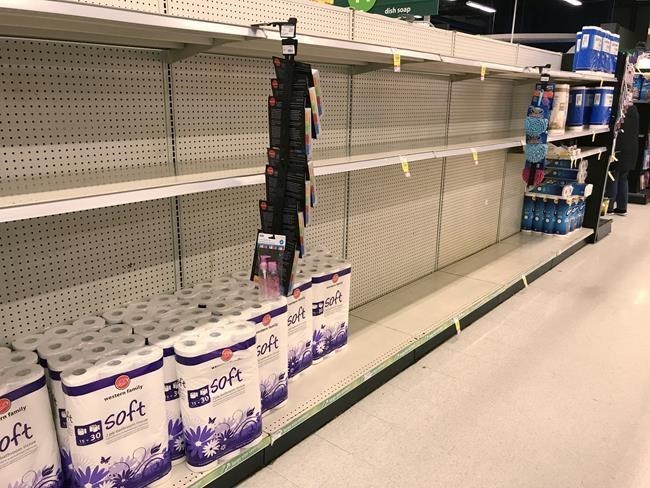OTTAWA — The demand for toilet paper in Canada has skyrocketed — increasing by 241 per cent during the COVID-19 pandemic.
Derek Nighbor, president of the Forest Products Association of Canada, revealed the eye-popping increase Friday in testimony to the House of Commons finance committee.
He told the committee that the forest products industry has rarely enjoyed such a high profile.
And that's not just because it produces toilet paper, which Canadians began stockpiling as soon as it became clear early last month that orders to stay home were imminent.
Nighbor said the sector is supplying the pulp needed to make sanitary wipes, paper towels, protective masks and hospital gowns.
It's also supplying the wood pellets, biofuels and green energy that feed heating systems and provincial power grids.
While Nighbor called the steep increase in demand for toilet paper "a bit of an anomaly" that will not last, he also signalled that the supply of pulp-based products could face trouble down the road as sawmills across the country shut down due to a pandemic-induced collapse in lumber prices.
Thirty-nine sawmills have temporarily closed, throwing thousands out of work and reducing the supply of wood chips that are needed to make pulp.
"Some of those essential products I talked about earlier are made possible because of Canada's pulp mills but, with sawmills going down, our pulp mills are starting to suffer," Nighbor said.
"They can't get the chips they need to make their in-demand products so some of them are starting to announce down-time as well."
With offices, stores and schools closed and advertising revenues down, he said pulp mills are also suffering from a collapse in demand for newsprint and other paper.
For now, most of the sawmill closures — 24 of the 39 — have been in British Columbia. But Nighbor said: "As this drags on, I'm increasingly concerned about capacity issues in the east as well."
Nighbor said the emergency aid measures implemented by the federal government to help businesses weather the storm have been little help to the sector.
For instance, he said the massive 75-per-cent wage subsidy program leaves "a large majority of players in our sector and our workers behind."
Nighbor said many companies operate a number of different mills and have not, overall, experienced sufficient decline in their revenues to be eligible for the wage subsidy. Rather than basing eligibility on a company's overall revenues, he urged the government to take a "mill-by-mill" approach, predicting that would keep thousands of workers on the job.
He also suggested that companies whose revenues have declined by smaller amounts of 10 or 15 per cent could be made eligible for a smaller wage subsidy of 40 or 50 per cent.
But Nighbor said the biggest worry in the sector is about the lack of liquidity to manage increased operating costs as prices for products are "falling off a cliff." He said the industry is not convinced that federal business loan programs offered so far will be sufficient and that lenders must be willing to take more risk than the banks have so far been willing to do.
"Our industry is not looking for a bail-out," Nighbor said. "What we're looking for is bolstered cash-flow support to keep our businesses operating through these difficult next two to three quarters."
The committee also heard Friday from Mary Robinson, president of the Canadian Federation of Agriculture.
She warned that farm labour shortages, unexpected pandemic-induced costs, supply chain disruptions and reduced capacity among food processors are eroding the confidence farmers need to invest in planting a crop or maintaining livestock herds — "decisions that must be made now and directly affect the availability and affordability of food later this year."
Without immediate federal help, Robinson said: "Canadian consumers could see a decrease in the amount and variety of food at their local grocery stores, as well as higher prices in the months ahead."
Robinson called for a flexible federal emergency fund specifically for farmers, priority access to personal protective equipment for agri-food workers, and measures to encourage Canadians to work on farms and in food processing plants. She also called on the government to enhance existing income-stabilization and support programs for farmers.
As well, Robinson echoed the Conservatives' long-standing demand that the federal government exempt farmers from the carbon tax.
This report by The Canadian Press was first published April 17, 2020.
Joan Bryden, The Canadian Press




